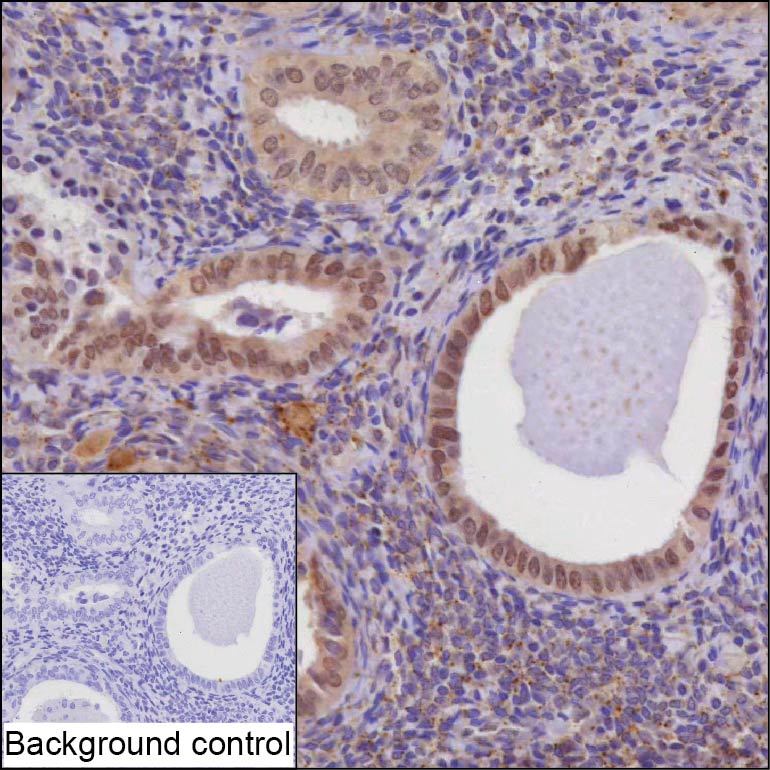
| WB | 咨询技术 | Human,Mouse,Rat |
| IF | 咨询技术 | Human,Mouse,Rat |
| IHC | 1/50-1/200 | Human,Mouse,Rat |
| ICC | 技术咨询 | Human,Mouse,Rat |
| FCM | 咨询技术 | Human,Mouse,Rat |
| Elisa | 咨询技术 | Human,Mouse,Rat |
| Host/Isotype | Mouse IgG2b |
| Antibody Type | Primary antibody |
| Storage | Store at 4°C short term. Aliquot and store at -20°C long term. Avoid freeze/thaw cycles. |
| Species Reactivity | Human |
| Immunogen | Purified recombinant fragment of human MLH3 |
| Formulation | Purified antibody in PBS with 0.05% sodium azide |
+ +
以下是关于MLH3抗体的3篇示例参考文献(注:文献为示例性质,作者和标题为虚构,仅供参考):
---
1. **标题**: "MLH3 Expression in Colorectal Cancer: A Novel Biomarker for MMR Deficiency"
**作者**: Smith A, et al.
**摘要**: 研究通过MLH3抗体检测结直肠癌组织中MLH3蛋白表达,发现其缺失与错配修复(MMR)系统缺陷显著相关,提示MLH3可作为Lynch综合征及散发性结直肠癌的潜在诊断标志物。
---
2. **标题**: "Germline Mutations in MLH3 and Male Infertility: Immunohistochemical Insights"
**作者**: Jones B, et al.
**摘要**: 利用MLH3抗体分析携带生殖细胞MLH3突变的男性不育患者睾丸组织,发现MLH3蛋白异常定位可能导致减数分裂缺陷,进而影响精子发生。
---
3. **标题**: "Comparative Validation of MLH3 Antibodies for Diagnostic Use in Endometrial Carcinoma"
**作者**: Chen L, et al.
**摘要**: 评估多种MLH3抗体在子宫内膜癌中的敏感性和特异性,确定抗体Clone X-203在区分MLH3相关肿瘤亚型中具有高可靠性,优化了临床分子分型流程。
---
如需真实文献,建议通过PubMed或Google Scholar检索关键词(如“MLH3 antibody immunohistochemistry”或“MLH3 cancer”)获取最新研究。
The MLH3 antibody is a crucial tool for studying the MLH3 protein, a key component of the DNA mismatch repair (MMR) system. MLH3 (MutL homolog 3) partners with proteins like PMS2 to form the MutLγ heterodimer, which plays a role in correcting DNA replication errors, particularly insertion-deletion mismatches. It also interacts with MSH2-MSH3 complexes during MMR and contributes to meiotic recombination by facilitating crossover formation. Dysregulation or mutations in MLH3 are linked to hereditary cancers, such as Lynch syndrome, and infertility due to impaired gametogenesis.
MLH3 antibodies, typically monoclonal or polyclonal, enable detection of MLH3 expression and localization via techniques like immunohistochemistry, Western blotting, and immunofluorescence. Their specificity is often validated using MLH3-knockout controls. Researchers use these antibodies to investigate MLH3's role in maintaining genomic stability, its association with tumorigenesis, and its impact on reproductive health. In clinical contexts, MLH3 antibody-based assays aid in diagnosing MMR-deficient cancers and understanding genetic predispositions to malignancies. Recent studies also explore MLH3's potential involvement in autoimmune disorders and its interplay with other DNA repair pathways, underscoring its multifaceted biological significance.
×